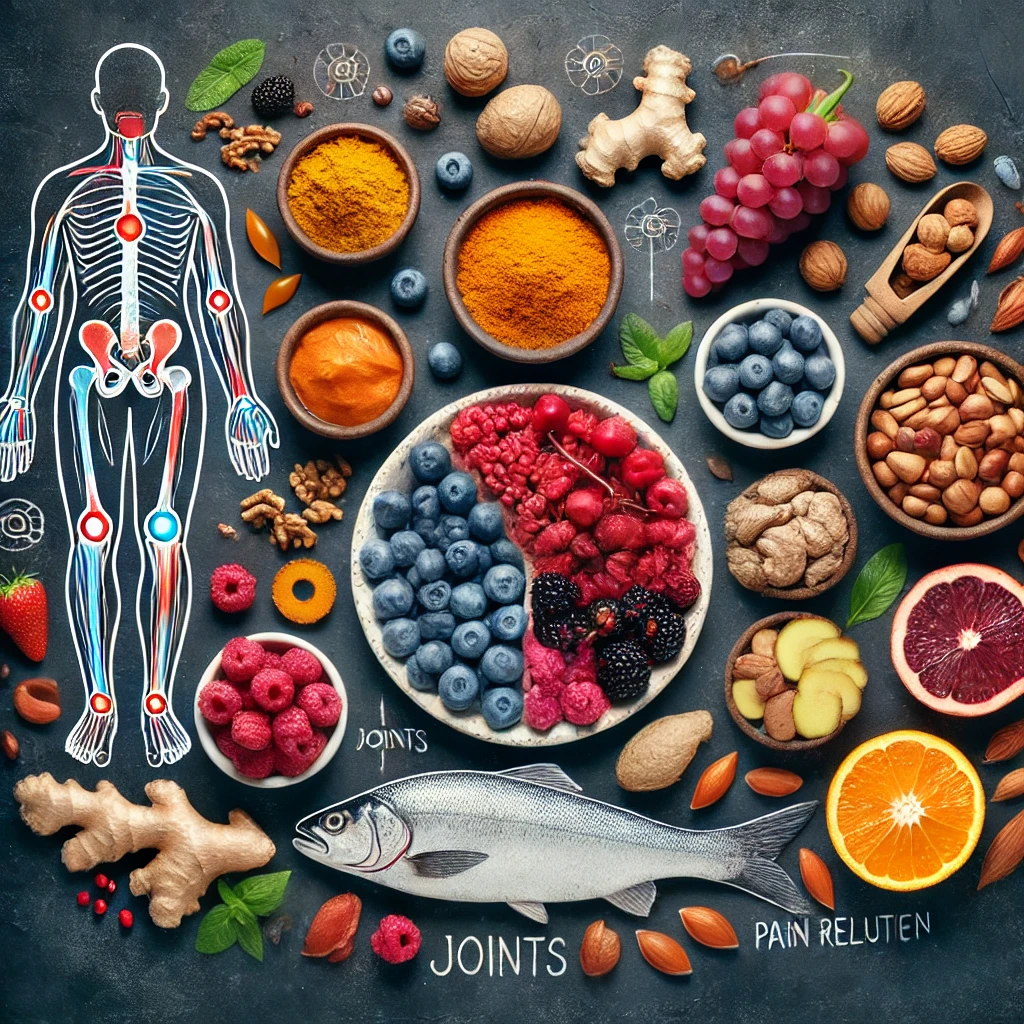Introduction:
Chronic pain affects millions of people worldwide, limiting quality of life and productivity. Conditions such as arthritis, fibromyalgia and back pain are common, and treatment approaches often focus solely on the use of medication. However, more and more research is showing that diet can play a crucial role in reducing chronic pain. A proper diet helps control inflammation, improve the immune system and even strengthen the body’s natural defenses against pain.
Hippocrates, considered the father of medicine, once said: “Let your food be your medicine and your medicine be your food“. This maxim reflects the power of nutrition to combat various health conditions, including pain. In this article, we’ll explore the relationship between diet and chronic pain reduction, highlighting the best dietary practices and strategies to help relieve pain naturally.
Part 1: Straight to the Point 🎯 – Basic Strategies and Practical Actions
Part 1, “Straight to the Point”, offers practical instructions and suggestions for immediate action.

1. Adopt an anti-inflammatory diet
Inflammation is one of the main causes of chronic pain. Processed foods, rich in refined sugars and saturated fats, can aggravate inflammatory processes in the body. Anti-inflammatory foods, on the other hand, help control this inflammation and consequently reduce pain. Include items such as
- Colorful fruits and vegetables: rich in antioxidants that fight inflammation.
- Fish rich in omega-3, such as salmon and sardines: these have an anti-inflammatory action and help relieve joint pain.
- Spices such as turmeric and ginger: these are powerful natural anti-inflammatories.
- Oilseeds, such as walnuts and almonds, which contain fats that are good for joint health.
These foods help the body fight inflammation more effectively, reducing the signals that generate chronic pain.
2. Consider 12-Hour Intermittent Fasting
Intermittent fasting, especially in the form of a 12-hour break between dinner and breakfast, can help control inflammation and regulate the immune response. This type of fasting gives the digestive system a much-needed rest, helping the body to focus on cell repair and the elimination of toxins, which can have a positive impact on reducing chronic pain.
This practice can be simple: eat dinner until no later than 8pm, and have breakfast at 8am. With this routine, the body has the time it needs to process the food and work on cell regeneration, which can result in a more controlled inflammatory response.
3. Maintain Planned Hydration
Water is essential for the functioning of every cell in the body and has a significant impact on pain reduction. Dehydration can aggravate joint pain and lead to muscle fatigue, which worsens chronic pain. Proper hydration planning, adjusted to body weight and activity level, can be very beneficial.
It is recommended that sedentary people drink around 35 ml of water per kg of body weight, while physically active people need around 50 ml per kg. This approach helps to keep the joints lubricated and ensure that the body eliminates toxins and waste, which can relieve pain and reduce physical discomfort.
4. Prefer Natural and Diversified Foods
Natural and diverse foods offer a variety of essential nutrients that strengthen the body. Industrialized products, rich in chemical additives, increase the body’s inflammatory load, making pain worse. By opting for a diet rich in fresh vegetables, fruit, whole grains and lean proteins, you give your body the nutrients it needs to fight inflammation and promote well-being.
Dietary diversity also helps maintain the balance of the intestinal microbiota, which has an impact on systemic inflammation. Gut health is directly linked to the immune system, and a balanced microbiota can reduce episodes of inflammation and, consequently, chronic pain.
5. Reduce Sugar and Processed Food Consumption
Sugar and processed foods are known to aggravate inflammation and can therefore increase pain. Avoiding soft drinks, sweets and processed foods helps to reduce the levels of inflammatory markers in the body. Replace refined sugars with natural alternatives, such as fruit, and opt for home-cooked meals whenever possible. Reducing sugar and food additives in the diet can result in significant relief from chronic pain symptoms.
Part 2: Explaining the Concept Cientificamente👨🏻🔬 -Deepening your knowledge
Part 2, “Explaining the Concept Scientifically”, provides a scientifically-based in-depth look at the “whys” and explains in more detail the suggestions set out in Part 1

Science has shown that diet has a profound impact on the body’s inflammatory state and, consequently, on chronic pain. Chronic low-grade inflammation, common in people with an unbalanced diet, is one of the main factors in the development and perpetuation of various painful conditions. We’ll explore below how food influences pain and inflammation, and how practices such as intermittent fasting and a natural diet can bring relief.
1. The Link Between Inflammation and Chronic Pain
Studies show that chronic pain is directly linked to persistent inflammation in the body, a condition that can be accentuated by pro-inflammatory foods. Research published in the Journal of Pain Research indicates that diets rich in saturated fats, refined sugars and processed products are associated with higher levels of inflammation, exacerbating pain conditions such as arthritis and fibromyalgia.
Anti-inflammatory foods, on the other hand, are rich in antioxidants, which neutralize the free radicals responsible for oxidative stress and inflammation. Fruits and vegetables, such as berries, leafy greens and oilseeds, have bioactive compounds that reduce the release of pro-inflammatory cytokines, helping to relieve pain over time.
2. Intermittent Fasting and the Reduction of Inflammatory Markers
Intermittent fasting has been extensively studied for its effects on inflammation and cell regeneration. During the fasting period, the body activates autophagy processes, in which damaged cells are eliminated and new tissue can be regenerated. This process of cell renewal helps to reduce the accumulation of inflammatory proteins and toxins in the body, factors that perpetuate chronic pain.
Studies in the American Journal of Clinical Nutrition show that intermittent fasting can reduce systemic inflammation, improving inflammatory markers such as CRP (C-reactive protein), which is directly associated with inflammation and pain. By adopting a light fast of 12 hours between dinner and breakfast, it is possible to start these repair processes without negative impacts, promoting a significant improvement in well-being.
3. Hydration and Joint Health
Water is fundamental for joint health, which is a sensitive point for many people with chronic pain. Adequate hydration helps maintain the integrity of cartilage, the tissue that protects the joints and which, when worn down, generates pain and discomfort. According to the European Journal of Clinical Nutrition, dehydration leads to a reduction in the cartilage’s shock absorption capacity, increasing sensitivity to pain.
In addition, water facilitates the elimination of toxins accumulated in the body, substances that can aggravate inflammation and pain. Maintaining planned hydration adjusted to weight and level of physical activity is essential to ensure that the body functions efficiently, reducing pain associated with joints and muscles.
4. Importance of the Intestinal Microbiota
The intestinal microbiota plays an important role in modulating inflammation and, consequently, chronic pain. A diet rich in natural and diverse foods provides fiber that feeds beneficial intestinal bacteria, promoting a healthy intestinal environment. Studies in Nature Reviews Immunology indicate that a balanced microbiota helps reduce the production of inflammatory cytokines, which can relieve pain and improve the immune response.
Fermented foods, such as natural yogurt and kimchi, as well as fiber sources like oats and vegetables, help diversify the microbiota. A healthy gut directly impacts the immune system and reduces inflammation, promoting relief for those suffering from chronic pain.
Conclusion
Conclusion
A well-planned diet rich in anti-inflammatory foods can be a powerful tool in the fight against chronic pain. Adopting a natural diet, including practices such as intermittent fasting and prioritizing adequate hydration are fundamental steps for those who want to reduce the impact of pain in a natural way. Incorporating these practices not only strengthens physical health, but also promotes general well-being.
To get started, try the following actions over the next week:
- Practice intermittent fasting for 12 hours between dinner and breakfast.
- Add anti-inflammatory foods to your diet, such as berries, turmeric and oilseeds.
- Plan your daily hydration, adjusting water consumption according to your weight and activity level.
These practices will contribute to the body’s balance and the gradual reduction of chronic pain, promoting a higher and more sustainable quality of life.

Kelton Tartarotti, a specialist in Health, Longevity and Lifestyle Reprogramming, brings an innovative approach to corporate and personal well-being in the Tartarotti Report. With a comprehensive background in Physical Education, including a BA, BSc and post-graduate studies in the Physiological Basis of Personalized Training and Sports Nutrition, Kelton has a solid foundation in sports and health sciences.
He is registered with the Regional Council of Physical Education (CREF-ES) under number: 005334-G/ES
His experience includes:
International certification as a Personal Trainer by the World Fitness Association (Florida/USA)
Coaching training by ABRACOACH
Specialization in Integrative Functional Health
15 years as a physical trainer for elite MMA athletes in world events
Working as a Physical Trainer at the Espírito Santo Olympic Center (COES)
In the Tartarotti Report, Kelton offers valuable insights into:
Scientifically-based executive health protocols
Stress management and resilience techniques for leaders
Sleep optimization strategies for cognitive performance
Functional nutrition adapted to corporate life
Efficient exercise programs for busy schedules







